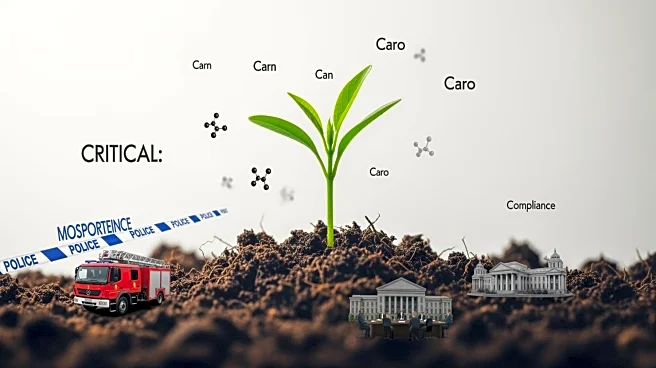What's Happening?
Regenerative agriculture is gaining traction as a method to address environmental impacts of intensive farming, which has degraded soils and contributed to climate volatility. InSoil, a climate finance company, is incentivizing farmers to adopt regenerative
practices that enhance soil carbon sequestration and reduce greenhouse gas emissions. This approach generates carbon credits that can be sold to companies seeking credible climate action. InSoil has enrolled over 700,000 hectares in its program and aims to issue more than four million verified carbon credits by 2027. The initiative is part of a broader movement towards sustainable agriculture, which is seen as a key strategy for climate resilience and food security.
Why It's Important?
The shift towards regenerative agriculture represents a significant opportunity for the agricultural sector to contribute to climate change mitigation. By improving soil health and productivity, regenerative practices can enhance resilience to climate change and support biodiversity. The carbon credits generated through these practices offer a financial incentive for farmers, potentially transforming agricultural economics. This movement aligns with global efforts to reduce carbon emissions and supports corporate net-zero pledges. As the carbon market grows, it could drive further investment in sustainable farming technologies and practices, benefiting both the environment and the agricultural industry.
What's Next?
The success of regenerative agriculture depends on widespread adoption and support from various stakeholders, including governments, corporations, and non-profits. Scaling these practices will require investment in farmer education, infrastructure, and technology. As more companies seek to offset their carbon footprints, the demand for carbon credits is likely to increase, potentially driving further innovation in sustainable agriculture. The development of robust regulatory frameworks and market mechanisms will be crucial to ensure the credibility and effectiveness of carbon credits.
Beyond the Headlines
Regenerative agriculture challenges traditional farming paradigms by prioritizing long-term soil health over short-term yield gains. This shift requires a fundamental change in mindset among farmers, agronomists, and policymakers. The movement also highlights the interconnectedness of environmental, economic, and social factors in agriculture, emphasizing the need for holistic approaches to food production and climate action.

















